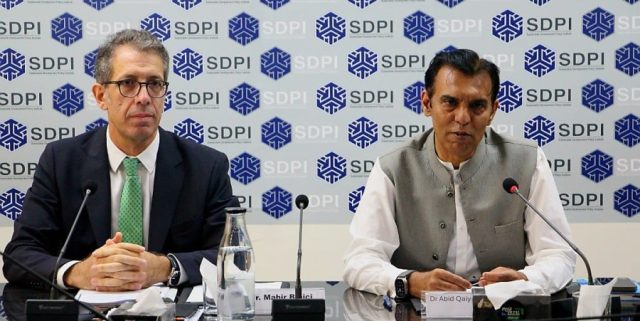ISLAMABAD, Sunday, July 13, 2025 (WNP): In a wide-ranging and forward-looking lecture at the Sustainable Development Policy Institute (SDPI), IMF Resident Representative for Pakistan, Mahir Binici, reaffirmed the Fund’s continued support for Pakistan’s economic stabilization and climate resilience agenda while outlining key regional and global economic trends.
Speaking to a diverse audience of economists, researchers, and policy experts, Binici projected strengthening growth across the Middle East, North Africa (MENA) region and Pakistan in 2025 and beyond. However, he warned that rising trade tensions, geopolitical fragmentation, and weakening global cooperation continue to cast a shadow of uncertainty over the global economic outlook.
Turning to Pakistan’s performance under the Extended Fund Facility (EFF), Binici acknowledged significant progress: “Pakistan’s performance under the EFF has been strong so far. The IMF Executive Board’s successful completion of the first review in May 2025 marked a major milestone,” he said.
He credited early policy measures with restoring macroeconomic stability and investor confidence, while emphasizing that deeper structural reforms—particularly those targeting tax equity, a more conducive business environment, and private-sector-led investment—are essential for long-term growth.
Binici also spotlighted Pakistan’s engagement with the IMF’s Resilience and Sustainability Facility (RSF)—a funding instrument aimed at helping vulnerable countries manage climate-related challenges while meeting international commitments.
“Support through the RSF will not only strengthen Pakistan’s climate resilience but also help unlock green investments and foster a more climate-conscious economic trajectory,” he noted.
Key RSF reform priorities include:
- Strengthening public investment planning
- Promoting efficient and sustainable water resource management
- Enhancing disaster preparedness and institutional coordination
- Improving transparency and access to climate-related data
Dr. Abid Qaiyum Suleri, Executive Director of SDPI, welcomed the IMF’s outreach, calling it an important step toward fostering informed economic dialogue and multilateral cooperation for sustainable development in Pakistan.
The lecture concluded with an interactive Q&A session exploring issues such as fiscal and monetary policy coordination, external financing buffers, and the evolving role of international institutions in supporting inclusive and climate-smart growth.
As Pakistan continues to navigate complex internal and external challenges, the IMF’s support—both financial and technical—remains a critical pillar of the country’s broader reform journey.




